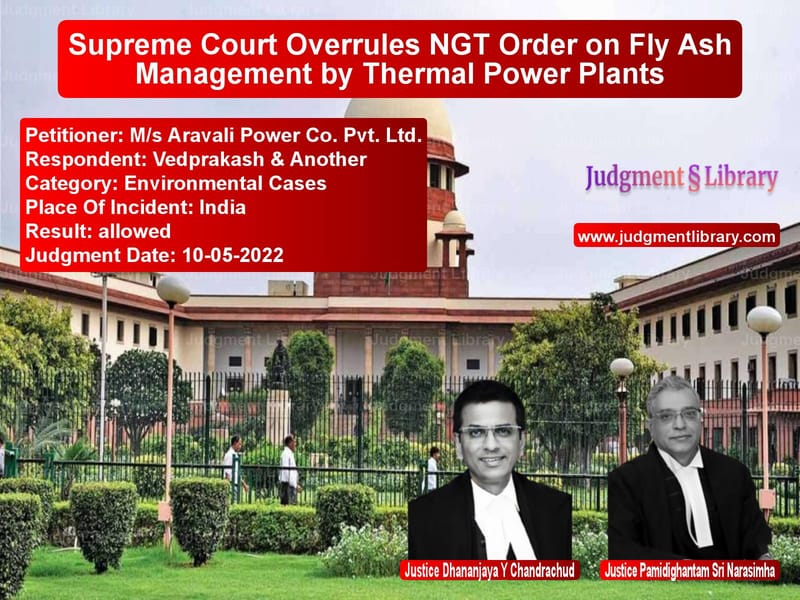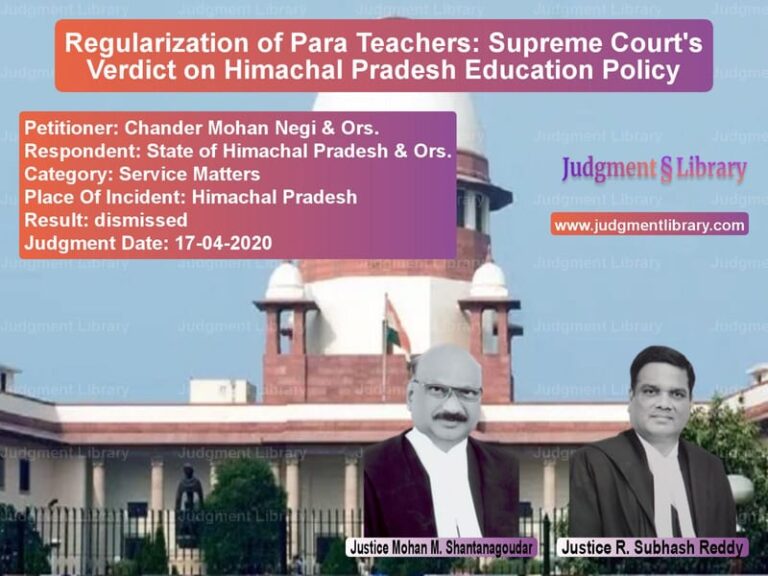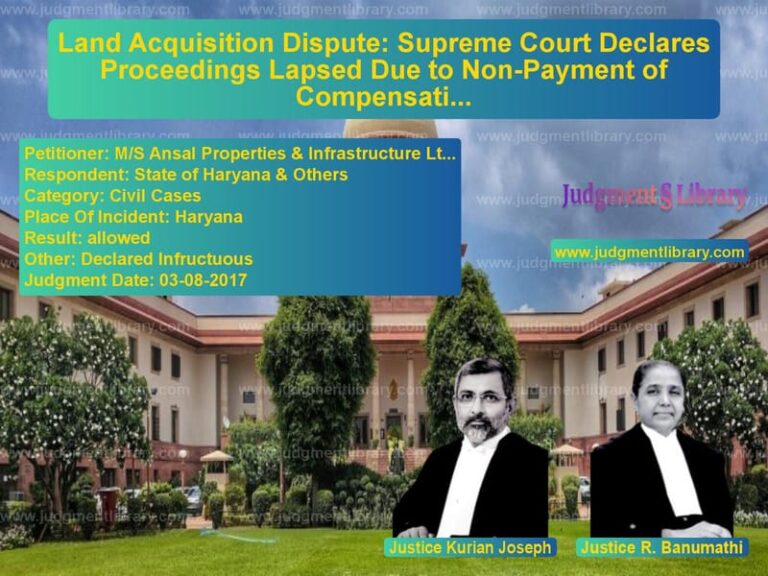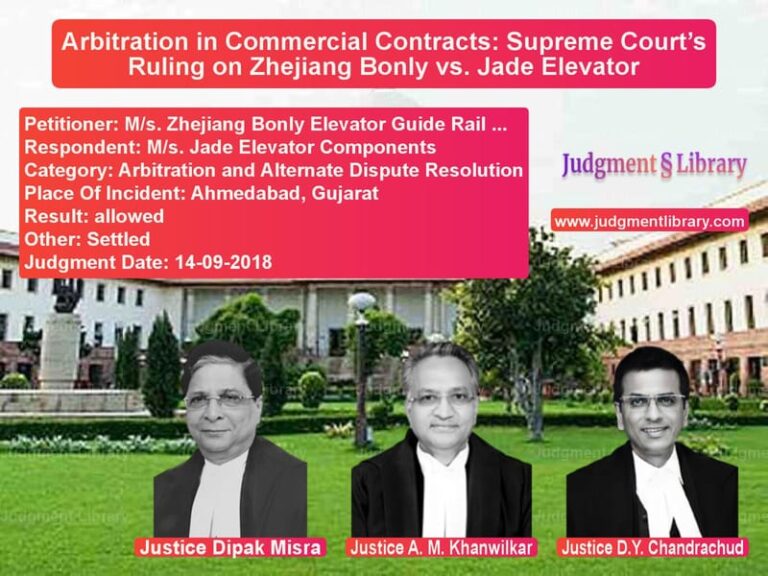Supreme Court Overrules NGT Order on Fly Ash Management by Thermal Power Plants
The Supreme Court of India recently delivered a crucial judgment concerning the environmental management of fly ash generated by thermal power plants (TPPs). The case, M/s Aravali Power Co. Pvt. Ltd. vs. Vedprakash & Another, arose from a series of orders issued by the National Green Tribunal (NGT) that imposed environmental compensation on power plants failing to utilize and dispose of fly ash scientifically. The Supreme Court set aside these orders, primarily due to the introduction of a new notification by the Ministry of Environment, Forest and Climate Change (MoEF&CC) that provided an extended compliance timeline for fly ash disposal.
Background of the Case
The case involved multiple appeals arising from various NGT orders, including:
- Orders dated 24 October 2019, 22 November 2019, 12 February 2020, 21 August 2020, and 16 September 2020.
- The core issue was the failure of thermal power plants to comply with MoEF&CC’s requirement to achieve 100% utilization of fly ash.
- The NGT imposed stringent environmental compensation measures on non-compliant plants.
Key Legal Issues
- Whether the NGT’s imposition of environmental compensation was justified.
- Whether the 31 December 2017 deadline for 100% fly ash utilization was still valid in light of new government regulations.
- The impact of the MoEF&CC’s 31 December 2021 notification on prior NGT rulings.
- The role of the Central Pollution Control Board (CPCB) in monitoring fly ash disposal.
Arguments by the Petitioners (Thermal Power Plants)
The appellants, primarily thermal power plant operators, argued that:
- The NGT’s orders were based on an outdated framework, and new government regulations provided additional time for compliance.
- Many plants had taken significant steps to improve fly ash utilization, but complete compliance required a phased approach.
- The MoEF&CC’s 31 December 2021 notification extended the fly ash disposal deadline by 10 years, making the NGT’s penalties unnecessary.
- The CPCB’s environmental compensation formula was arbitrary and did not consider the actual ground realities.
Counterarguments by the Respondents
The respondents, led by environmental activists and local complainants, contended that:
- Thermal power plants had consistently ignored fly ash disposal regulations, causing severe environmental and health hazards.
- The NGT had correctly imposed penalties to ensure compliance with existing laws.
- The 2021 notification did not absolve power plants of their responsibility to address past violations.
- Immediate enforcement of fly ash disposal rules was necessary to prevent irreversible environmental damage.
Supreme Court’s Observations
The Supreme Court, while analyzing the case, noted:
1. The 2021 Notification Provides a New Compliance Framework
“The MoEF&CC’s notification dated 31 December 2021 supersedes prior regulations and establishes a new phased approach for fly ash disposal.”
The notification allows power plants to progressively utilize stored fly ash over a 10-year period instead of mandating immediate compliance.
2. Environmental Compensation Cannot Be Retrospective
“The NGT’s imposition of environmental compensation retrospectively contradicts the principles of fairness and proportionality.”
The Court held that plants should be assessed based on the latest legal framework rather than penalized for past non-compliance under outdated regulations.
3. CPCB’s Role in Monitoring Compliance
“The CPCB must ensure strict implementation of the MoEF&CC notification while balancing industrial needs and environmental sustainability.”
The Court directed the CPCB to establish clear monitoring mechanisms to track compliance with the 2021 notification.
Final Judgment
The Supreme Court ruled:
- The NGT’s orders imposing environmental compensation were set aside.
- The MoEF&CC’s 2021 notification will govern fly ash disposal moving forward.
- The CPCB was instructed to oversee the phased implementation of fly ash disposal measures.
- Future violations of fly ash disposal regulations would be subject to fresh penalties based on the latest rules.
Impact of the Judgment
This ruling has several significant implications:
- Regulatory Clarity: The judgment aligns fly ash disposal requirements with the latest government policies, providing clarity for power plants.
- Balancing Industrial and Environmental Concerns: The Court recognized the need for gradual compliance rather than immediate penalties.
- Strengthened Oversight: The CPCB’s role in monitoring fly ash management has been reinforced.
- Implications for Future Environmental Cases: This case sets a precedent for considering new regulatory frameworks when adjudicating environmental disputes.
With this decision, the Supreme Court has established a balanced approach to environmental regulation, ensuring compliance while allowing industries the necessary time to adapt.
Petitioner Name: M/s Aravali Power Co. Pvt. Ltd..Respondent Name: Vedprakash & Another.Judgment By: Justice Dhananjaya Y Chandrachud, Justice Pamidighantam Sri Narasimha.Place Of Incident: India.Judgment Date: 10-05-2022.
Don’t miss out on the full details! Download the complete judgment in PDF format below and gain valuable insights instantly!
Download Judgment: ms-aravali-power-co-vs-vedprakash-&-another-supreme-court-of-india-judgment-dated-10-05-2022.pdf
Directly Download Judgment: Directly download this Judgment
See all petitions in Environmental Cases
See all petitions in Corporate Compliance
See all petitions in Public Interest Litigation
See all petitions in Judgment by Dhananjaya Y Chandrachud
See all petitions in Judgment by P.S. Narasimha
See all petitions in allowed
See all petitions in supreme court of India judgments May 2022
See all petitions in 2022 judgments
See all posts in Environmental Cases Category
See all allowed petitions in Environmental Cases Category
See all Dismissed petitions in Environmental Cases Category
See all partially allowed petitions in Environmental Cases Category







